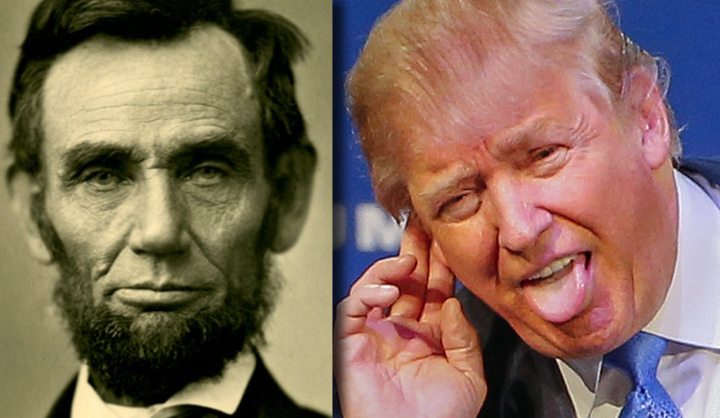World
Trump v Lincoln: Condolences from two US presidents, a universe apart

In which J. BROOKS SPECTOR notes Donald Trump’s slithering around the truth in the self-made controversy over his condolence call to a widow of a US soldier killed in an ambush in Niger. In this case, Spector finds that the president has failed a test first set out by Abraham Lincoln in 1864. (And in discussing this first controversy, we’ll just have to postpone a planned exploration of a White House document circulated by the president and prepared by senior trade adviser Peter Navarro that alleged a weakened manufacturing sector leads to an increase in abortion, spousal abuse, divorce and infertility. Too many stories, so little time.)
“Alice laughed: ‘There’s no use trying,’ she said; ‘one can’t believe impossible things.’
‘I daresay you haven’t had much practice,’ said the Queen. ‘When I was younger, I always did it for half an hour a day. Why, sometimes I’ve believed as many as six impossible things before breakfast.’ ” – From Lewis Carroll’s “Alice in Wonderland”
Many readers will undoubtedly recall an early scene in the film Saving Private Ryan in which US General George C Marshall takes out a copy of a letter written by Abraham Lincoln and reads it to his staff officers in his Washington headquarters. After reading it aloud, he announces that the army must find and remove Pvt James Francis Ryan from the Normandy battlefield in the first days of the liberation of Europe, once it has been discovered Pvt Ryan’s three brothers have already been killed in the continuing conflict.
Lincoln’s brief letter to Mrs Lydia Bixby, when it was understood that all five of her sons had perished in the midst of the Civil War, is so wrenchingly heartfelt that its 146 words have become the template for a leader’s expressions of condolence to surviving family members. Go ahead, read it aloud to grasp its full impact – and see if you can stay with it to the end without wiping back a tear or two. The text reads:
Executive Mansion,
Washington, 21st November, 1864.
Dear Madam,
I have been shown in the files of the War Department a statement of the Adjutant General of Massachusetts that you are the mother of five sons who have died gloriously on the field of battle.
I feel how weak and fruitless must be any word of mine which should attempt to beguile you from the grief of a loss so overwhelming. But I cannot refrain from tendering to you the consolation that may be found in the thanks of the Republic they died to save.
I pray that our Heavenly Father may assuage the anguish of your bereavement, and leave you only the cherished memory of the loved and lost, and the solemn pride that must be yours to have laid so costly a sacrifice upon the altar of Freedom.
Yours, very sincerely and respectfully,
A. Lincoln
It probably doesn’t matter that the War Department got its facts slightly scrambled. Two of those supposedly deceased sons actually survived the war and one had been an army deserter; or even that the real Mrs Bixby was something of a publicity seeker over her supposed plight. Regardless, President Lincoln (perhaps in conjunction with his private secretary, John Hay) had set the template for how a letter from a national leader to a grieving widow, parent, or surviving child in recognition of the loss of a soldier or sailor in battle must be crafted.
Now, shift forward from 1864 to the present where President Donald Trump managed to fumble his way through a phone call to the family of a US serviceman killed in an ambush in Niger with about the most insensitive thing one could say to someone whose husband had just been killed. As reported in The Washington Post the other day,
“In his call with Sgt. La David T. Johnson’s widow, Myeshia Johnson, Trump told her, ‘He knew what he was signing up for, but I guess it hurts anyway,’ according to the account of Rep. Frederica S. Wilson (D-Fla.), who was riding in a limousine with Johnson when the president called and heard the conversation on speakerphone.
“Wilson recalled in an interview with The Washington Post that Johnson broke down in tears. ‘He made her cry,’ Wilson said. The congresswoman said she wanted to take the phone and ‘curse him out,’ but that the Army sergeant holding the phone would not let her speak to the president. The White House neither confirmed nor denied Wilson’s account. ‘The President’s conversations with the families of American heroes who have made the ultimate sacrifice are private,’ a White House official said in a statement.
“But in a Twitter post Wednesday, Trump claimed Wilson ‘totally fabricated’ her account of his call to the widow. Trump went on to back up his assertion by insisting he has ‘proof’.
“ ‘Democrat Congresswoman totally fabricated what I said to the wife of a soldier who died in action (and I have proof). Sad!’ Trump wrote.
“Wilson stood her ground. Speaking on MSNBC, she called Trump’s call ‘horrible’ and ‘insensitive’. ‘She was in tears. She was in tears. And she said, “He didn’t even remember his name,” ’ said Wilson.”
At about this time, readers should really be asking themselves whether the president had managed to rise to embrace Lincolnesque language or if he had just fumbled his way through yet another tough guy bit of wording to prove just how strong he was when he was in negotiations with a bank over their exposure in a loan to one of Trump’s failing casinos.
Of course, heaping abuse on a congresswoman and denying his language had been a tad insensitive, Trump wasn’t finished with putting his disrespect fog machine into high gear. In trying to explain why he had taken nearly two weeks to even say anything about the four dead servicemen in Niger, he insisted that unlike all other presidents, he, Trump, had written letters; he had called and he had attempted to console the families. Right. Sometimes it seems Trump is a living embodiment of Lewis Carroll’s playing card queen and her ability to blithely believe anything she wanted to believe, just because she said so.
Aside from the obvious example of Abraham Lincoln (although the 16th president, of course, had not been able to use a telephone since it would not be until nearly 20 years more before it was invented), many other chief executives had done the right thing. But Trump saved his most special scorn for his predecessor, Barack Obama. Washington Post coverage of these events explained it this way:
“But a president who revels in providing colour commentary on the news said nothing about what happened in Niger for 12 straight days — until Monday in the Rose Garden of the White House, where he was asked by a reporter to explain his uncharacteristic silence.
“In his answer, Trump said in his defence that he had written personal letters to the soldiers’ family members, and he then tried to use the issue to gain a political advantage. Trump levelled false accusations at his predecessors, including former president Barack Obama, saying they never or rarely called family members of service members who were killed on their watch, when in fact they regularly did.
“As anger swelled, Trump continued to attempt to bolster his broader claim Tuesday by invoking the death of Marine 1st Lt. Robert Kelly, the son of White House Chief of Staff John F. Kelly who was killed in 2010 while serving in Afghanistan.”
He tried to draw his Chief of Staff into this newly filled swamp to wonder aloud whether or not Barack Obama had called Kelly (the father) to offer his condolences. With his dignity largely intact, Kelly declined to speak about it.
Eventually, as sometimes happens when one of Trump’s lies, exaggerations or bait-and-switch, gotcha Twitter exchanges is challenged, he dialled back just a bit, expressing his lack of knowledge of what Barack Obama had actually done or didn’t do, insisting he’d heard the previous president hadn’t respected those who had died in combat.
The problem, of course, is that on at least one very public – widely broadcast – occasion, witnessed by millions, there was the sombre-faced President Obama at Dover Air Force Base, embracing the families of Afghanistan conflict military casualties, speaking the right words of comfort, and delivering broader public remarks that hit the tone required of such a moment of public mourning as the caskets had kept coming out onto the tarmac from the belly of the giant military transport jet.
Given the ample evidence by now that Donald Trump will never, ever become a public speaker who can either give aid and comfort to his fellow citizens without a snarky, sideways smirk or snarl, or understand the gravitas needed of a president in times of distress, it is useless to expect he will ever rise to the level of Athenian leader Pericles, in his “Oration Over the Athenian Dead”, let alone the words of any of his predecessors in the White House. But the least one could expect is that he will attempt to demonstrate at a minimum the demeanour required of a 10-year-old at the funeral of an aged and well-loved relative, even if he will rarely if ever be able to show any genuine empathy for others. DM
Photo: USA’s 16th President Abraham Lincoln (L), and 45th President, Donald Trump (EPA)

















 Become an Insider
Become an Insider